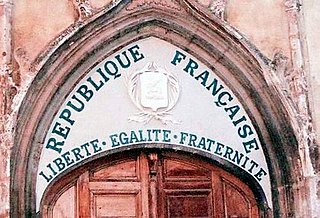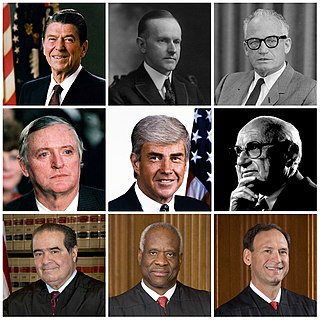
Federalism is the mixed or compound mode of government, combining a general government with regional governments in a single political system. Its distinctive feature, exemplified in the founding example of modern federalism by the United States under the Constitution of 1787, is a relationship of parity between the two levels of government established. It can thus be defined as a form of government in which there is a division of powers between two levels of government of equal status.

The federal government of Nigeria is composed of three distinct branches: legislative, executive, and judicial, whose powers are vested by the Constitution of Nigeria in the National Assembly, the President, and the federal courts, including the Supreme Court, respectively.
The separation of powers is a model for the governance of a state. Under this model, a state's government is divided into branches, each with separate and independent powers and areas of responsibility so that the powers of one branch are not in conflict with the powers associated with the other branches. The typical division is into three branches: a legislature, an executive, and a judiciary, which is the trias politica model. It can be contrasted with the fusion of powers in some parliamentary systems where the executive and legislative branches overlap.
Civil liberties or personal freedoms are personal guarantees and freedoms that the government cannot abridge, either by law or by judicial interpretation, without due process. Though the scope of the term differs between countries, civil liberties may include the freedom of conscience, freedom of press, freedom of religion, freedom of expression, freedom of assembly, the right to security and liberty, freedom of speech, the right to privacy, the right to equal treatment under the law and due process, the right to a fair trial, and the right to life. Other civil liberties include the right to own property, the right to defend oneself, and the right to bodily integrity. Within the distinctions between civil liberties and other types of liberty, distinctions exist between positive liberty/positive rights and negative liberty/negative rights.
A federal republic is a federation of states with a republican form of government. At its core, the literal meaning of the word republic when used to reference a form of government means: "a country that is governed by elected representatives and by an elected leader rather than by a king or queen".

Laïcité, literally "secularity", is a French concept of secularism. It discourages religious involvement in government affairs, especially religious influence in the determination of state policies; it also forbids government involvement in religious affairs, and especially prohibits government influence in the determination of religion.

In political science, legitimacy is the right and acceptance of an authority, usually a governing law or a régime. Whereas "authority" denotes a specific position in an established government, the term "legitimacy" denotes a system of government—wherein "government" denotes "sphere of influence". An authority viewed as legitimate often has the right and justification to exercise power. Political legitimacy is considered a basic condition for governing, without which a government will suffer legislative deadlock(s) and collapse. In political systems where this is not the case, unpopular régimes survive because they are considered legitimate by a small, influential élite. In Chinese political philosophy, since the historical period of the Zhou Dynasty, the political legitimacy of a ruler and government was derived from the Mandate of Heaven, and unjust rulers who lost said mandate therefore lost the right to rule the people.

In political philosophy, limited government is where the government is empowered by law from a starting point of having no power, or where governmental power is restricted by law, usually in a written constitution. It is a key concept in the history of liberalism. The United States Constitution presents an example of the federal government not possessing any power except what is delegated to it by the Constitution — with the Tenth Amendment to the United States Constitution making explicit that powers not specifically delegated to the federal government are reserved for the people and the states. The Magna Carta and the United States Constitution also represents important milestones in the limiting of governmental power. The earliest use of the term limited government dates back to King James VI and I in the late 16th century. Limited government put into practice often involves the protection of individual liberty from government intrusion.
Rechtsstaat is a doctrine in continental European legal thinking, originating in German jurisprudence. It can be translated into English as "rule of law", alternatively "legal state", "state of law", "state of justice", "state of rights", or "state based on justice and integrity".

Federalist No. 78 is an essay by Alexander Hamilton, the seventy-eighth of The Federalist Papers. Like all of The Federalist papers, it was published under the pseudonym Publius.

The Constitutional Court of Korea is an independent and specialised court in South Korea, whose primary role is the reviewing of constitutionality under the Constitution of the Republic of Korea. It also has administrative law functions such as ruling on competence disputes between governmental entities, giving final decisions on impeachments, and making judgments on the dissolution of political parties.

The Supreme Court of Liberia is the highest judicial body in the West African nation of Liberia. The court consists of the Chief Justice of Liberia, who is also the top Judiciary official, and four Associate Justices, who are nominated by the President and confirmed by the Senate. The justices hold court at the Temple of Justice on Capitol Hill in Monrovia.

The Government of Romania forms one half of the executive branch of the government of Romania. It is headed by the Prime Minister of Romania, and consists of the ministries, various subordinated institutions and agencies, and the 42 prefectures. The seat of the Romanian Government is at Victoria Palace in Bucharest.

The Constitution of the Republic of Kazakhstan is the highest law of Kazakhstan, as stated in Article 4. The Constitution was approved by referendum on 30 August 1995. This date has since been adopted as the "Constitution Day of the Republic of Kazakhstan".
In politics and law, liberal legalism is a belief that politics should be constrained by legal constitutional boundaries. Liberal legalism has also been called legal constitutionalism, such as is found in United States and Germany, with political constitutionalism, which is more typical of Britain, by British constitutional scholar Adam Tomkins. He argues in his book Our Republican Constitution that the British system of governance, in which Parliament controls government ministers, provides a better check on executive power than a system like that of the United States, where courts and laws are used to check executive power.
Judicial review is a process under which executive or legislative actions are subject to review by the judiciary. A court with authority for judicial review may invalidate laws acts and governmental actions that are incompatible with a higher authority: an executive decision may be invalidated for being unlawful or a statute may be invalidated for violating the terms of a constitution. Judicial review is one of the checks and balances in the separation of powers: the power of the judiciary to supervise the legislative and executive branches when the latter exceed their authority. The doctrine varies between jurisdictions, so the procedure and scope of judicial review may differ between and within countries.
Constitutionalism is "a complex of ideas, attitudes, and patterns of behavior elaborating the principle that the authority of government derives from and is limited by a body of fundamental law".

The Comptroller General of Chile is a constitutionally autonomous body of the Government of Chile based on chapter 10 of the Constitution of Chile and it is in charge of the control of the legal aspects, management, preaudit and postaudit functions of all the activities of the centralized and decentralized civil service, whatever its forms of organization may be, as well as of other powers granted by law.

Separation of powers in Singapore is founded on the concept of constitutionalism, which is itself primarily based upon distrust of power and thus the desirability of limited government. To achieve this, the Constitution of the Republic of Singapore splits the power to govern the country between three branches of government – the legislature, which makes laws; the executive, which executes them; and the judiciary, which enforces them. Each branch, while wielding legitimate power and being protected from external influences, is subjected to a system of checks and balances by the other branches to prevent abuse of power. This Westminster constitutional model was inherited from the British during Singapore's colonial years.












